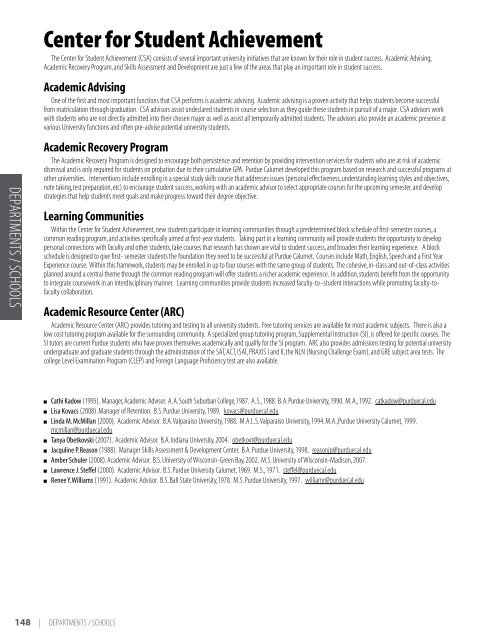Download - Purdue University Calumet
Download - Purdue University Calumet
Download - Purdue University Calumet
Create successful ePaper yourself
Turn your PDF publications into a flip-book with our unique Google optimized e-Paper software.
departments / schools<br />
Center for Student Achievement<br />
The Center for Student Achievement (CSA) consists of several important university initiatives that are known for their role in student success. Academic Advising,<br />
Academic Recovery Program, and Skills Assessment and Development are just a fewof the areas that play an important role in student success.<br />
Academic Advising<br />
One of the first and most important functions that CSA performs is academic advising. Academic advising is a proven activity that helps students become successful<br />
from matriculation through graduation. CSA advisors assist undeclared students in course selection as they guide these students in pursuit of a major. CSA advisors work<br />
with students who are not directly admitted into their chosen major as well as assist all temporarily admitted students. The advisors also provide an academic presence at<br />
various <strong>University</strong> functions and often pre-advise potential university students.<br />
Academic Recovery Program<br />
The Academic Recovery Program is designed to encourage both persistence and retention by providing intervention services for students who are at risk of academic<br />
dismissal and is only required for students on probation due to their cumulative GPA. <strong>Purdue</strong> <strong>Calumet</strong> developed this program based on research and successful programs at<br />
other universities. Interventions include enrolling in a special study skills course that addresses issues (personal effectiveness, understanding learning styles and objectives,<br />
note taking, test preparation, etc) to encourage student success, working with an academic advisor to select appropriate courses for the upcoming semester, and develop<br />
strategies that helpstudents meet goals and make progress toward their degree objective.<br />
Learning Communities<br />
Within the Center for Student Achievement, newstudents participate in learning communities through a predetermined block schedule of first-semester courses, a<br />
common reading program, and activities specifically aimed at first-year students. Taking part in a learning community will provide students the opportunity to develop<br />
personal connections with faculty and other students, take courses that research has shown are vital to student success, and broaden their learning experience. A block<br />
schedule is designed to give first- semester students the foundation they need to be successful at <strong>Purdue</strong> <strong>Calumet</strong>. Courses include Math, English, Speech and a First Year<br />
Experience course. Within this framework, students may be enrolled in upto four courses with the same groupof students. The cohesive, in-class and out-of-class activities<br />
planned around a central theme through the common reading program will offer students a richer academic experience. In addition, students benefit from the opportunity<br />
to integrate coursework in an interdisciplinary manner. Learning communities provide students increased faculty-to -student interactions while promoting faculty-tofaculty<br />
collaboration.<br />
Academic Resource Center (ARC)<br />
Academic Resource Center (ARC) provides tutoring and testing to all university students. Free tutoring services are available for most academic subjects. There is also a<br />
lowcost tutoring program available for the surrounding community. A specialized grouptutoring program, Supplemental Instruction (SI), is offered for specific courses. The<br />
SI tutors are current <strong>Purdue</strong> students who have proven themselves academically and qualify for the SI program. ARC also provides admissions testing for potential university<br />
undergraduate and graduate students through the administration of the SAT, ACT, ISAT, PRAXIS I and II, the NLN (Nursing Challenge Exam), and GRE subject area tests. The<br />
college Level Examination Program (CLEP) and Foreign Language Proficiency test are also available.<br />
Cathi Kadow (1995). Manager, Academic Advisor. A. A. South Suburban College, 1987. A. S., 1988. B. A. <strong>Purdue</strong> <strong>University</strong>, 1990. M. A., 1992. catkadow@purduecal.edu<br />
Lisa Kovacs (2008). Manager of Retention. B.S. <strong>Purdue</strong> <strong>University</strong>, 1989. kovacs@purduecal.edu<br />
Linda M. McMillan (2000). Academic Advisor. B.A. Valparaiso <strong>University</strong>, 1988. M.A.L.S. Valparaiso <strong>University</strong>, 1994. M.A.,<strong>Purdue</strong> <strong>University</strong> <strong>Calumet</strong>, 1999.<br />
mcmillan@purduecal.edu<br />
Tanya Obetkovski (2007). Academic Advisor. B.A. Indiana <strong>University</strong>, 2004. obetkovt@purduecal.edu<br />
Jacquline P. Reason (1988). Manager Skills Assessment & Development Center. B.A. <strong>Purdue</strong> <strong>University</strong>, 1998. reasonjp@purduecal.edu<br />
Amber Schuler (2008). Academic Advisor. B.S. <strong>University</strong> of Wisconsin-Green Bay, 2002. M.S. <strong>University</strong> of Wisconsin-Madison, 2007.<br />
Lawrence J. Steffel (2000). Academic Advisor. B.S. <strong>Purdue</strong> <strong>University</strong> <strong>Calumet</strong>, 1969. M.S., 1971. steffel@purduecal.edu<br />
Renee Y. Williams (1991). Academic Advisor. B.S. Ball State <strong>University</strong>,1978. M.S. <strong>Purdue</strong> <strong>University</strong>, 1997. williamr@purduecal.edu<br />
148 | departments / schools

















